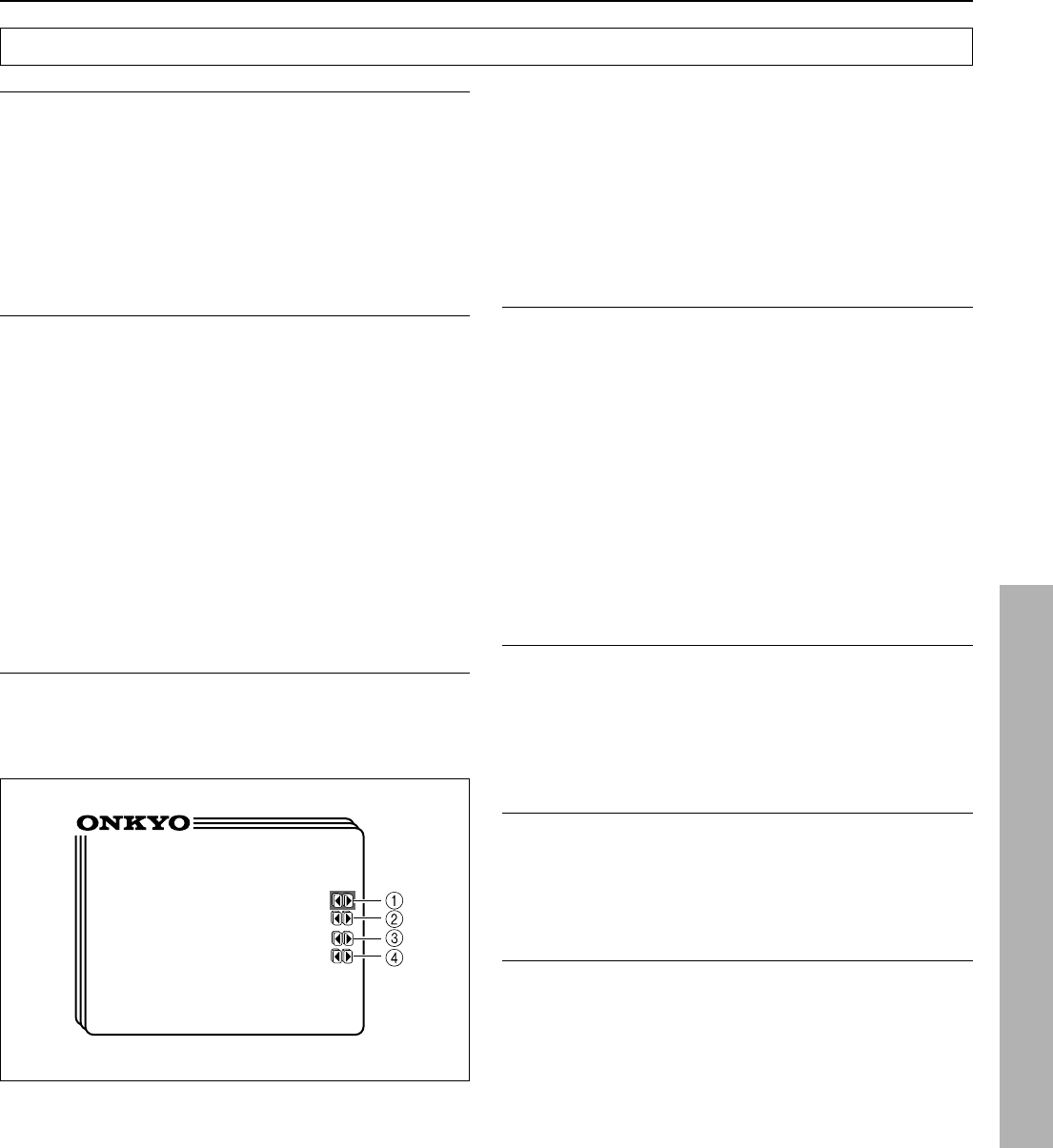
39
Setting the listening mode parameters
Listening mode parameters
• Re-EQ (Cinema Re-Equalization)
Select “ON” or “OFF.”
The Re-EQ function is effective except for “5CH STEREO” and
“DIRECT.”
Re-Equalization takes the edginess or “brightness” out of your
home cinema sound, compensating for the fact that sound mixed for
theaters will sound too bright when played back through speakers in
the home environment.
• Late Night
Select “High,” “Low,” or “OFF.”
Cinema sound has a vast dynamic range and therefore, to hear quiet
sound such as environmental sound and human conversations, it
must be played back at large sound volumes. When this parameter is
set to “High” or “Low,” however, the dynamic range of the sound is
narrowed down to allow you to hear easily minute sound at low vol-
umes. This function is useful if you wish to play a movie at low
volumes, especially in midnight.
Notes:
• The depth of the Late Night effect is determined by Dolby Digi-
tal software. Some sounds may produce no or little effect.
• The Late Night function is effective only on Dolby Digital en-
coded software.
• LFE (Low Frequency Effect) level
This parameter is used to adjust the level of LFE in Dolby Digital,
or DTS software. When this parameter is selected, the following
screen appears.
Note:
• The LFE level setting is effective only on Dolby Digital or DTS
software.
With some software, this setting may produce no effect.
• Front Effect
Select “ON” or “OFF.”
Some live recordings contain acoustic reverberation. When you
play these sources, more reverberation will be applied by the DSP,
creating too much reverb effects and the sound loses its frame or
presence. In this case, set FRONT EFFECT to OFF. No reverbera-
tion from the DSP will be applied to the sound output from three
front channels, and the sound source will be played as it is without
any further reverberation.
Note:
The Front Effect function is effective only on the Action, Musical,
MonoMovie, Orchestra, Unplugged, Studio-Mix, and TV Logic
sound.
• Reflect Level
Set a value between -5 and +5 dB, in units of 1 dB.
You can adjust the strength of direct sound reflection, depending on
the playback source material, your audio room conditions, and so
on.
• Reverb Level (DTR-7 only)
Set a value between -5 and +5 dB, in units of 1 dB.
Adjust the depth of acoustic reverberation, depending on the play-
back source material, your audio room conditions, and so on.
• Room Size (DTR-7 only)
Set “Large,” “Mid,” or “Small.”
Change the virtual hall size set for each surround mode.
1. Adjust this parameter when the source is “Dolby Digital.”
Select “-∞ dB,” “-20dB,” “-10dB,” “or “0dB.”
The recommended setting is “0dB.”
2. Adjust this parameter when the source is “DTS” and the
surround mode is “DTS.”
Select “-∞ dB,” “-20dB,” “0dB,” or “+10dB.”
The recommended setting is “+10dB.”
3. Adjust this parameter when the source is “DTS” and the lis-
tening mode is “DTS Action,” “DTS Musical,” “DTS THX,”
or “DTS Mono Movie.”
Select “-∞ dB,” “-20dB,” “-10dB,” or “0dB.”
The recommended setting is “0dB.”
4. Adjust this parameter when the source is “DTS” and the lis-
tening mode is “DTS Orchestra,” “DTS Unplugged,” “DTS
Studio-Mix,” or “DTS TV Logic.”
Select “-∞ dB,” “-10dB,” “0dB,” or “+10dB.”
The recommended setting is “+10dB.”
* LFE Level Setup *
Dolby Digital :0dB
DTS :0dB
Cinema Group :0dB
Music Group :0dB


















